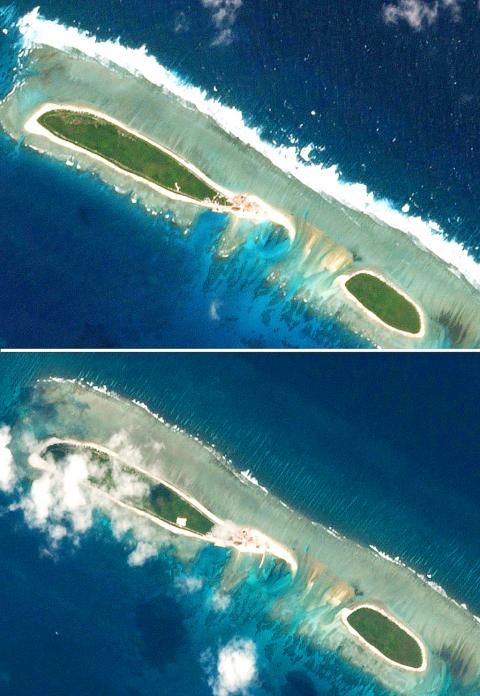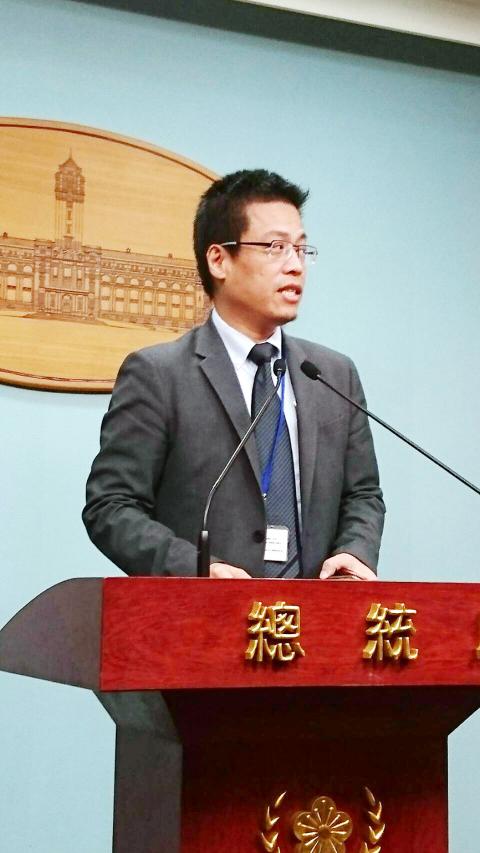China has started fresh construction work in the disputed South China Sea, new satellite images show, a sign that Beijing is continuing to strengthen its military reach across the vital trade waterway.
Regional military attaches and experts believe the work shows China’s determination to build up its network of reefs and islets, even if it is seeking to avoid a fresh confrontation with the US President Donald Trump’s administration.
An image of North Island (北島) in the Paracel Islands (Xisha Islands, 西沙群島) taken on Monday last week shows recent work including land clearing and possible preparation for a harbor to support what experts believe might be eventual military installations. Initial work was damaged in a typhoon last year.

Photo: Reuters
The pictures, provided by private satellite firm Planet Labs, follow reports in January showing work undertaken on nearby Tree Island (Jhaoshu Island, 趙述島) and other features in the Paracels, which are also claimed by Taiwan and Vietnam.
Diplomats briefed on the latest Western intelligence assessments say Beijing is pursuing efforts to dominate its maritime “backyard,” even if it tweaks the timing of moves to avoid being overtly provocative.
“The Paracels are going to be vital to any future Chinese attempt to dominate the South China Sea,” said Carl Thayer, a South China Sea expert at the Australian Defence Force Academy. “We can see they are committed to militarization, whatever the official rhetoric tells us, even if they are going to do it bit by bit.”

Photo: Chung Li-hua, Taipei Times
The more widely disputed Spratly Islands (Nansha Islands, 南沙群島) to the south are higher profile, but the Paracels are key to China’s presence in the South China Sea.
China has temporarily based surface-to-air missile launchers and jets at long established bases on Woody Island (Yongxing Island, 永興島) in the Paracels, helping protect its nuclear submarine facilities on Hainan Island.
North Island is part of an arc of reefs that are expected to form a protective screen for Woody, which includes civilian facilities and a listening post.
Zhang Baohui (張寶輝), a security expert at Hong Kong’s Lingnan University, said he believed China was pursuing its goal of strengthening its facilities in the Paracels and had calculated that the Trump administration would not overreact given other priorities.
“There’s also uncertainty with this young Trump administration, but this is very important work to the Chinese ... the Paracels are vital to defending Hainan, which is in turn important to China’s nuclear deterrent,” Zhang said. “The calculation here is that it is really only Vietnam that will be rattled by this.”
The Vietnamese Ministry of Foreign Affairs did not respond to requests for comment.
The Chinese Ministry of National Defense said it was “not familiar” with any work at North Island.
“What needs to be stressed is that the Xisha Islands are China’s inherent territory,” it said.
A US official, speaking on the condition of anonymity, was unable to confirm new construction work on North Island, but said it would not be surprising.
“It would be in line with what they have been doing, why else would they be clearing land on the islands but for militarization,” the official said. “There is no other reason to have a presence there.”

TPP RALLY: The clashes occurred near the Chiang Kai-shek Memorial Hall on Saturday at a rally to mark the anniversary of a raid on former TPP chairman Ko Wen-je People who clashed with police at a Taiwan People’s Party (TPP) rally in Taipei on Saturday would be referred to prosecutors for investigation, said the Ministry of the Interior, which oversees the National Police Agency. Taipei police had collected evidence of obstruction of public officials and coercion by “disorderly” demonstrators, as well as contraventions of the Assembly and Parade Act (集會遊行法), the ministry said in a statement on Sunday. It added that amid the “severe pushing and jostling” by some demonstrators, eight police officers were injured, including one who was sent to hospital after losing consciousness, allegedly due to heat stroke. The Taipei

NO LIVERPOOL TRIP: Taiwan’s Lin Yu-ting, who won a gold medal in the boxing at the Paris Olympics, was embroiled in controversy about her gender at that event Taiwanese boxer Lin Yu-ting (林郁婷) will not attend this year’s World Boxing Championships in Liverpool, England, due to a lack of response regarding her sex tests from the organizer, World Boxing. The national boxing association on Monday said that it had submitted all required tests to World Boxing, but had not received a response as of Monday, the departure day for the championships. It said the decision for Lin to skip the championships was made to protect its athletes, ensuring they would not travel to the UK without a guarantee of participation. Lin, who won a gold medal in the women’s 57kg boxing

The US has revoked Taiwan Semiconductor Manufacturing Co’s (TSMC, 台積電) authorization to freely ship essential gear to its main Chinese chipmaking base, potentially curtailing its production capabilities at that older-generation facility. American officials recently informed TSMC of their decision to end the Taiwanese chipmaker’s so-called validated end user (VEU) status for its Nanjing site. The action mirrors steps the US took to revoke VEU designations for China facilities owned by Samsung Electronics Co and SK Hynix Inc. The waivers are set to expire in about four months. “TSMC has received notification from the US Government that our VEU authorization for TSMC Nanjing

‘NOT ALONE’: A Taiwan Strait war would disrupt global trade routes, and could spark a worldwide crisis, so a powerful US presence is needed as a deterrence, a US senator said US Senator Deb Fischer on Thursday urged her colleagues in the US Congress to deepen Washington’s cooperation with Taiwan and other Indo-Pacific partners to contain the global security threat from China. Fischer and other lawmakers recently returned from an official trip to the Indo-Pacific region, where they toured US military bases in Hawaii and Guam, and visited leaders, including President William Lai (賴清德). The trip underscored the reality that the world is undergoing turmoil, and maintaining a free and open Indo-Pacific region is crucial to the security interests of the US and its partners, she said. Her visit to Taiwan demonstrated ways the